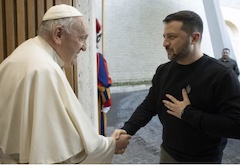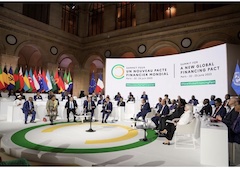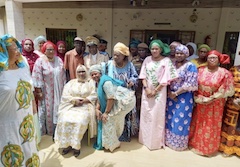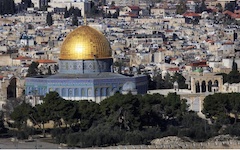Little has changed since our bulletin of February 17 in which we quoted authorities saying that with the war in Ukraine we are “sleepwalking to Armageddon. This month, Anthony Blinken, the American cabinet minister responsible for foreign affairs, CIA, etc., insisted that the war should be continued because a ceasefire “would legitimize Russia’s land grab. It would reward the aggressor and punish the victim.”
But there are efforts for peace. In CPNN this month, we cite those of the African countries, the Pope, Presiden Lula of Brazil, the Chinese government, and the civil society meeting in Vienna.
The most recent initiative comes from a delegation of African countries that met with President Zelensky in Kiev and President Putin in St. Petersburg. The delegation included the presidents of South Africa, Comoros, Senegal, and Zambia as well as the prime minister of Egypt and representatives of the presidents of the Republic of the Congo and Uganda. “This war has to have an end. It must be settled through negotiations and through diplomatic means . . . This war is having a negative impact on the African continent and indeed, on many other countries around the world,” said South African President Cyril Ramaphosa.
In his meeting with the African delegation, Putin mentioned a draft peace agreement that was drawn up with the help of Turkish President Erdogan: “It was called treaty of permanent neutrality and security guarantees of Ukraine,” Putin said, adding that the document included 18 articles pertaining to Ukraine’s security. But the agreement was never realized, for which Putin blamed the other side.
As described in a recent CPNN article, Pope Francis has launched a peace mission aimed at finding a settlement of the Russia-Ukraine war, upsetting Ukraine’s allies with his refusal to insist that Russia leave Ukraine as a starting point for negotiations. The pope has appointed Cardinal Matteo Zuppi as a special envoy for his peace mission.
The Pope’s initiative reflects his support in general for the culture of peace. In April of this year, he diffused a video throughout the world, saying, “Let us develop a culture of peace. Let us remember that, even in cases of self-defense, peace is the ultimate goal, and that lasting peace can exist only without weapons. Let us make non-violence a guide for our actions, both in daily life and in international relations.”
Recently, the Pope met with Brazil President Lula and they discussed Lula’s proposal of a group of countries to mediate in possible negotiations between Kyiv and Moscow. Lula’s proposal has elicited little response from the international community.
The Chinese government also presented a peace proposal earlier this year, and Chinese envoys have met the leaders of both Ukraine and Russia to promote it. While the proposal was dismissed by NATO, it was welcomed by many in the Global South, although some questioned whether Chinese threats against Taiwan did not contradict the principles of their proposal.
The Chinese initiative also reflects its public support for the culture of peace. In a video about President Xi Jinping’s recent visit to the Chinese Academy of History, the Deputy Director-General of the Academy says that, “The pursuit of peace and harmony is the foundation of the Chinese spirit. It is in the gene of Chinese civilization. In the 5,000-year history, our ideal world is of great unity. We value a culture of peace and unity.”
As for the civil society, during the weekend of June 10-11 in Vienna, Austria, over 300 people representing peace organizations from 32 countries came together for the first time since the Russian invasion of Ukraine to demand an end to the fighting. Despite the uniform bottom line of the participants, which was a call for peace talks, there were plenty of disagreements about what should be mentioned in the final declaration. Noting these disagreements, participant Medea Benjamin says that “the most important segment of the final document and the gathering itself was the call for further actions.” “This weekend should be seen as just the start,” said organizer Reiner Braun. “We need more days of action, more gatherings, more outreach to students and environmentalists, more educational events. But this was a great beginning of global coordination.”
As expressed in a blog this month by the CPNN coordinator, “Are we sleep-walking to Armageddon, as some have predicted? Or will the forces for peace be able to end the Ukraine War? . . . As the late Daniel Ellsberg warned us, our world hangs in the balance.”
|
DISARMAMENT & SECURITY |
TOLERANCE & SOLIDARITY |
SUSTAINABLE DEVELOPMENT |
FREE FLOW OF INFORMATION |







